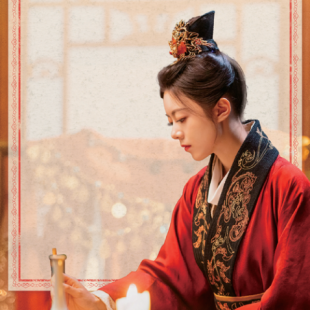Tale of power and redemption

According to Moshubai, when depicting this fictional dynasty, she drew on various social phenomena from the Wei, Jin, and Southern and Northern Dynasties (220-589) as well as the Tang Dynasty (618-907), including the ancient Chinese imperial examination system and the conflict between noble houses and commoners in the court.
Yet, in this series, it is not a male-dominated game. "In this fantasy world that emphasizes descent rather than gender, the political arena is open to a blue-blooded woman with talent," said Moshubai.
For instance, in the final episode released yesterday, Li finally wins in the palace mutiny and governs the country as Regent Princess Royal, achieving her political aspiration to create a fairer, more merit-based society.
Apart from the unstable power dynamics in the palace court, another highlight in the drama that has resonated with audiences is the depiction of exquisite emotions within the context of Eastern aesthetics.
In the eyes of Yuan Yumei, chief executive producer of the drama, the essence of the story is something we've all fantasized about: if you could wake up one day as your younger self from 20 years ago, how would you relive your life?
Yuan explained that the Chinese name of the drama, Du Hua Nian, comes from a verse by Tang Dynasty poet Li Shangyin (813-858): "Why should the sad zither have fifty strings? Each string, each strain evokes but vanished springs."
"The poet reflected on his youth in this verse, and I hope everyone can live every day to the fullest with their beloved ones," Yuan said.
This poetic quality, which permeates almost every aspect of the drama, also enhances the mood among the characters.
"I was really impressed by the scene where Li and Pei gazed at each other in a bustling night market fair," said Moshubai, noting that the numerous historical replicas used as props emphasize the varied stages of antique beauty, allowing the scene to capture the charm of ancient China and the essence of youthful romance.
However, the portrayal of every subtle nuance of emotion has increased the demand on actors.
"It is a bit challenging to portray an 18-year-old girl with a 38-year-old soul," said actress Zhao Jinmai, who plays Li in the drama.
In Zhao's view, the princess is mentally trapped in the past in her second life, hoping to correct many mistakes from her youth. As she revisits these regretful moments, she continues to uncover new insights.
"Many people would say that if they had a second chance in life, they might choose differently. But after filming The Princess Royal, I believe Princess Li Rong has already made the best decisions for herself in both of her lives," said Zhao, adding that making the best choices in the present is what truly matters.
Although the emotional entanglements between Li and Pei span two lifetimes, love is not the entirety of Li's existence.
Unlike the stereotypical image of a princess, Li is intelligent and self-reliant, able to stand on her own. She consistently gains the upper hand in power struggles and ultimately propels her career to new heights.
"I really like one of Li's lines: 'I don't like to leave my fate in the hands of others; I want to control my destiny,'" said Zhao, adding that Li hopes to use her power to protect more innocents.
According to Moshubai, Li is a typical Confucian leader, who is dedicated to benefiting all people.
"For Li, being a princess means not great dignity but great responsibility," she said.
Yuan believes that the Confucian values portrayed in the drama could provide an ethical foundation for universal principles. She also noted the drama's potential to reach audiences far beyond Asia.
"The drama is rooted in Eastern culture, but its story is global," she said.





































